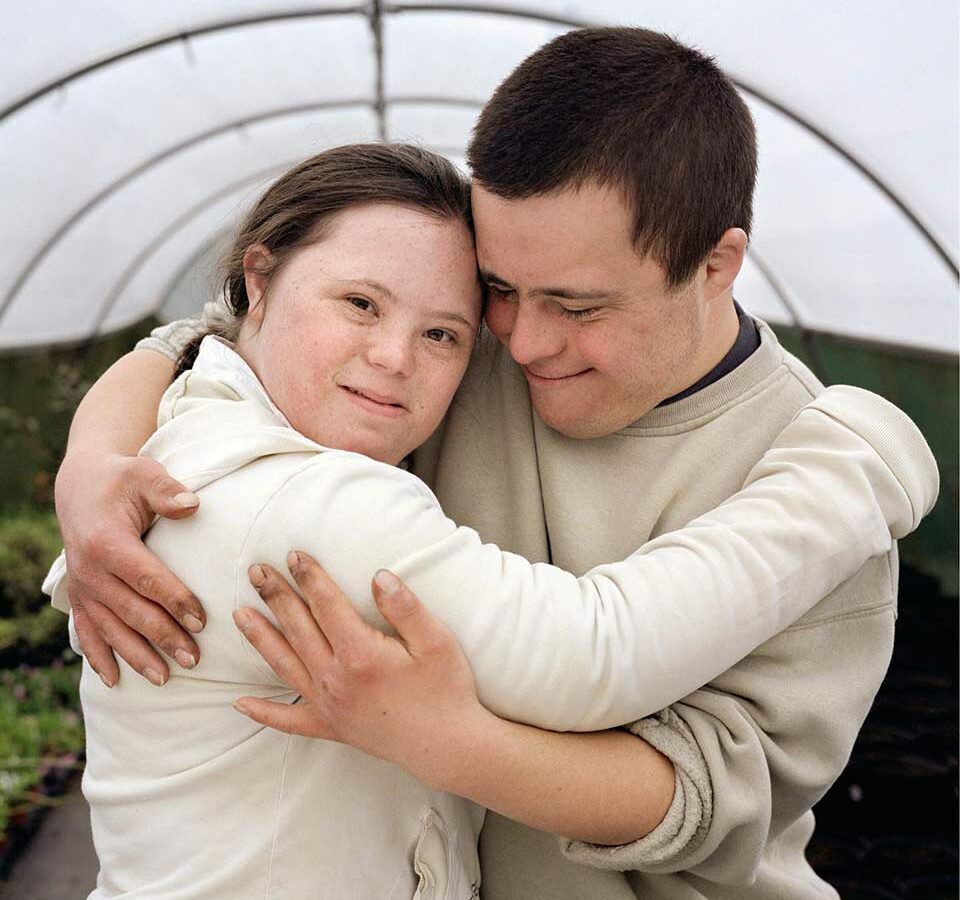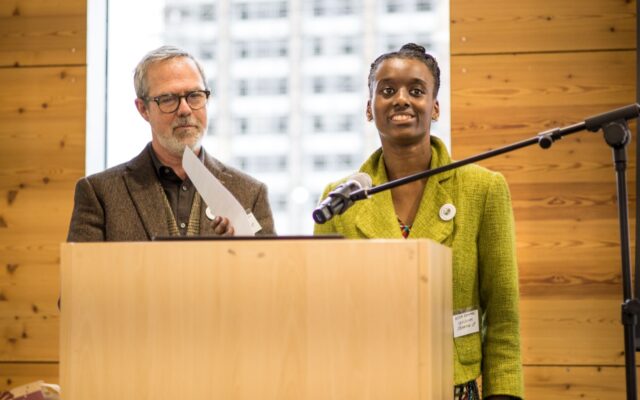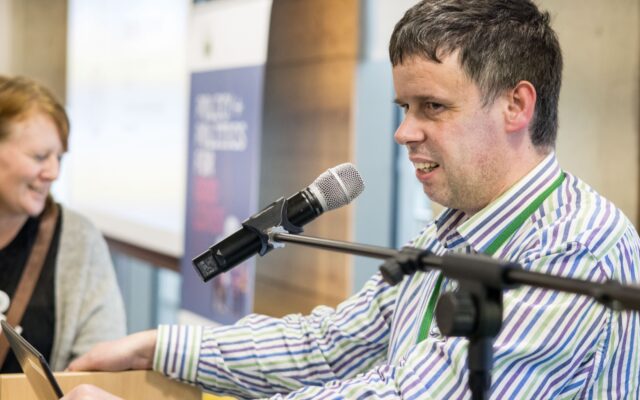A law to ensure people with Down syndrome have their health, care and housing needs met throughout life is working its way through parliament (writes Simon Jarrett). It could become law early next year.
The Down Syndrome Bill is a private member’s bill – it is proposed and sponsored by an individual MP, in this case former GP and conservative Liam Fox.
Its sponsor in the House of Lords is Baroness Sheila Hollins, a crossbench (politically unaffiliated) peer involved in campaigning work on behalf of people with learning disabilities.
The critical issue – if and when the law is passed – will be the nature of the guidance
The bill is short and states its aim is to “make provision about meeting the needs of persons with Down syndrome”.
It will place a duty on the secretary of state for health and social care to give guidance to the NHS and local authorities “on steps it would be appropriate for them to take in order to meet the needs of persons with Down syndrome in the exercise of their relevant functions”. These authorities would be obliged to “have due regard” to the guidance.
Although private members’ bills usually fail to become law, the Down Syndrome Bill is likely to be successful as it has government support.
In November, the bill was approved by MPs at its first stage and is now going through the House of Lords. If approved by both the House of Commons and the Lords, it could be enacted in early 2023.
The bill has caused controversy. Supporters argue that legislation specifically related to people with Down syndrome is required because they have specific needs.
They hope that, if the bill becomes law, it will have positive results for other people with learning disabilities.
Opponents argue that the law should not prioritise particular groups but entitle all people with learning disabilities to have a better life.
There has been some heated debate online and offline, including some abuse and trolling.
Community Living invited self-advocates from both sides of the debate to explain their thoughts and perspectives.
Each was keen to emphasise that they respected the views of the other and wished to be part of a respectful and civilised debate.
Both agreed to contribute only on that basis, and emphasised that far more unites than divides them.
the Down Syndrome Bill can be downloaded from: https://bills.parliament.uk/bills/2899
‘Policy should address the needs of people with Down syndrome as a distinct group’ – Fionn Crombie Angus (with support from Jonathan Angus)
I am one of five founding officers with Down syndrome of the National Down Syndrome Policy Group (NFSPG). As the title founding officer suggests, we were there at the beginning: not an afterthought, as some tick-box parody of real inclusion.
Those of us who are chromosomally abundant make up roughly one-third of our leadership committee.
We helped to clarify what we are seeking and strategised how to achieve it. I can assure you, our voices have been kept front and centre, and the policy group’s process and flow has been frequently adapted to suit all members.
It was my suggestion that our group’s slogan should be Changing the Narrative because I love stories, and the life stories of too many people with Down syndrome are poorly written, or dull, or tragic.
Aiming for greater inclusivity, we five recently formed an advisory group, inviting adults with Down syndrome from across the UK to tell us what is good and what is challenging about their lives.
We also teach them about the bill, and about our roles liaising with government because, while self-advocacy is a good start, we want to encourage bigger action.
Down syndrome is a thing, distinct from any other thing – an identifiable genetic condition that can lead to some basic common needs requiring specific support and interventions.
For example, there is a learning profile specific to Down syndrome, typically requiring specialist speech and language intervention. Children and young people experience greater hospitalisation and for longer periods, and adults are predisposed to early-onset Alzheimer’s.
Nearly everyone can identify the characteristic appearance of Down syndrome. In the past, there was a lot of stigma, and there still is. The main ingredient in stigma is ignorance.
I believe this law will, along with the more quantifiable effects, dissolve much of that stigma. That’s something we can all celebrate.
Virtually everyone with Down syndrome is labelled with learning disability, but learning disability isn’t actually a thing. It’s a way governments lump together people on the margins. Lumping sometimes helps people, often not, but it’s always a bit arbitrary and changeable.
In the same way that the Autism Act 2009 aims to address the needs of a distinct group of people who have a wide profile of experience, it makes sense for policy to address the needs of people with Down syndrome as a distinct group.
This legislation has evolved beyond that one, though, as it addresses not only adults but children as well. Down syndrome is as different from autism as foetal alcohol syndrome is from Turner syndrome, or as different as brain injuries are from mental health challenges.
This bill is focused on clarifying and enforcing provision that should be available across a range of disabilities. It should actually benefit people with other disabilities as, with greater recognition of the specific needs, there will be a greater awareness of the need to adapt provision.
Many of my friends with a variety of living experiences of disability support the Down Syndrome Bill although it is not focused directly on them, in the same way that I can work for racial equality, support victims of domestic abuse etc. We can all work for the wellbeing of many groups that we are not ourselves members of.
Lastly, I’d like to point out I live in the Republic of Ireland. I’ll receive no direct benefit when the bill is enacted.
I was invited to join the NDSPG because of my skills, interests and passions. Like all the other members, I receive no pay for the work. I do hope that other countries will take inspiration from the Down Syndrome Act and create their own versions, and I’d like to help with those, too.
National Down Syndrome Policy Group: https://ndspg.org/
Fionn Angus is a self-advocate and researcher and lobbyist with the National Down Syndrome Policy Group.
More on the bill
BBC news report: https://tinyurl.com/2p9y38ee
Down’s Syndrome Association: thoughts on the Down Syndrome Bill: https://tinyurl.com/mumkeycz
Mencap: statement on Down Syndrome Bill: www.mencap.org.uk/blog/down-syndrome-bill
Special Needs Jungle: what’s the point of the Down Syndrome Bill? One parent’s view, plus a legal opinion: https://tinyurl.com/2s3nbhy5
Everyone with learning disabilities should be treated equally’ – Self-advocates from Learning Disability England respond
As a membership organisation, Learning Disability England consulted members about the Down Syndrome Bill just before its second reading in November 2021.
A group of members with learning disabilities said: “While we think the bill is a good idea as people with Down syndrome do need to have their rights protected, we are worried it is not inclusive to everyone with learning disabilities.”
More than 100 individual or organisational members took part in the consultation and, while some supported it, the majority were concerned or opposed for this reason.
However, that does not take away from the huge achievement of those involved with the bill in highlighting inequalities and the need for change.
The members’ group said: “We looked at the easy-read guidance for the Down Syndrome Bill. We spent time discussing it.
“We strongly believe everyone with learning disabilities should be treated equally. This means their rights are protected and they receive good care and support.
“We question why this bill is treating people with Down syndrome differently from others with learning disabilities.
“Most people with learning disabilities experience similar challenges with maternity, education, employment, health care and social care, not just people with Down syndrome.
“We are people with different learning disabilities. All of us have experienced challenges with education, employment, healthcare and social care.
“Many of us have experienced prejudice, which prevents us from getting paid work, or have felt unwanted in a workplace.
“Many of us have negative experiences of school which impacted our education.
“Why are our rights and entitlements to good care, support, education and employment not protected by this bill?
“For these reasons, we are concerned about this bill.”
Learning Disability England believes all people with learning disabilities should have a good life. More unites us than divides us. Members want to see the laws, policies and guidance we already have used properly.
The Down Syndrome Bill will not change the laws we have now. It will offer guidance to local authorities. The people writing the guidance will have a lot of power.
Members have said it is important that people with lived experience are at the heart of developing any guidance. And that it should be based on the views of people with learning disabilities.
Learning Disability England wants the government to commit to making the guidance in an open and inclusive way. What is important now is for everyone to focus on genuine co-production, with people with learning disabilities at its heart, to create the guidance together.
The government has just published the People at the Heart of Care: Adult Social Care Reform white paper. This is based around three key objectives: people have choice, control and support to live independent lives; people can access outstanding quality and tailored care and support; and people find adult social care fair and accessible.
Learning Disability England wants the government to make sure councils and the NHS have enough money to support all people with learning disabilities.
If the government’s vision is delivered, it would mean all young people with learning disabilities and their families get good, person-centred support and education.
And adults with learning disabilities of all ages get the right support and enough money to live good lives in their own homes in the community. – www.learningdisabilityengland.org.uk

MP Liam Fox says the law is needed because people with Down’s syndrome are starting to outlive their parents and placing them in “inappropriate institutions” would be a “scandal”
Images: Number10gov/Flickr CC BY-NC 2.0; Fiona Yaron-Field/Wellcome Collection CC BY 4.0 / Wessex Regional Genetics Centre/Wellcome Collection CC BY 4.0





